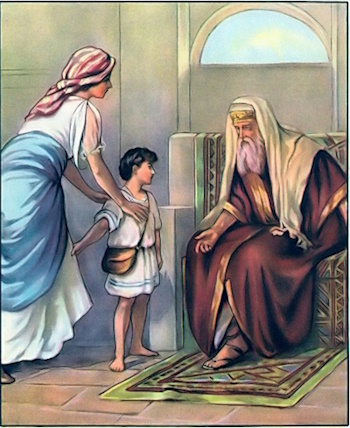
'The Barren Woman'.
“Barren” is a biblical term. The Bible uses it to acknowledge and name the deep suffering of a woman who wants to have children but can’t, a childless mother. Hannah was married to a good man. Elkanah kept God's Law and regularly went up to Shiloh, where the Tabernacle was, to worship God (in the time before the Temple). But his wife, Hannah was barren, a serious curse back then, a man needed an heir to carry on his name, children were necessary to continued survival. This may even have been the reason that Elkanah took a second wife. Elkanah tried to comfort Hannah, he loved her very much but his second wife, did give him children and with the rivalry that occurs when women share a man, Peninah constantly rubbed it in Hannah's face that she was barren. So today we read how Hannah is being emotionally battered by her opponent. In her desperation, she would respond with faith; faith that changed the course of Israel.
The situation Hannah was in was indicative of life in Israel at the time, it was the time of the Judges and Israel was a mess. My big question was what sort of person was Peninah, the other wife, to treat Hannah this way? Everyone back then understood the deep grief and misery behind the word "barren". The Bible validates their pain by putting their plight alongside that of the global poor (see Psalm 113 at Breakfast). Obviously Peninah was not a good Jewish woman, so one has to ask was she an idolater who wanted to “rub it in” that Hannah’s God was inferior to hers?
Many women today choose not to have children, more concerned with their career goals or their Ecological footprint, or just not wanting to bring a child into a world so full of suffering. Some decide there are so many children who need a family, that they would rather provide a loving home to a needy child than be concerned with having biological offspring. But there are still today hundreds of women who want to have children but are, like the biblical Hannah, Sarah (Genesis 21) and Elizabeth (Luke 1-2) suffering from infertility.
If you are one of them, know God validates your pain! He gives you permission to express grief with all of the intensity and desperation you feel. The Bible gives you permission to feel the deep wells of pain, but also calls you to trust in the Lord for your deliverance. While technology has advanced and can often help, I took Hannah's solution. My daughter was told by doctors that she could not have children. My response was faith like Hannah's. When she told me I said, "Yeah right! (with complete disdain for what the doctors knew, I know God!)" I put my hand on her shoulder and prayed, two weeks later she was pregnant, my wonderful grand-daughter is now 12 years old - Thank you Lord!
 Welcome
Welcome Calendar
Calendar Today's Word
Today's Word Lauds
Lauds Terce
Terce Sext
Sext None
None Vespers
Vespers Compline
Compline Matins
Matins